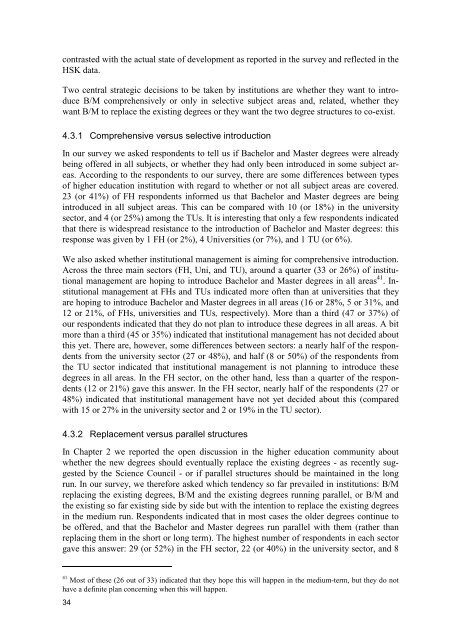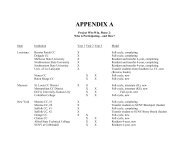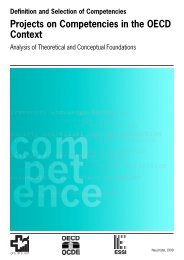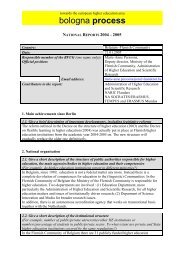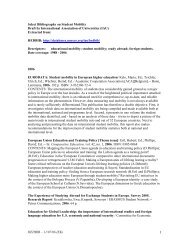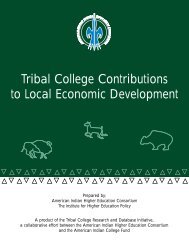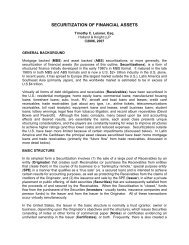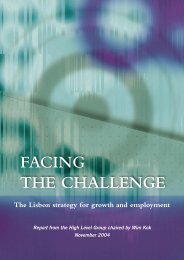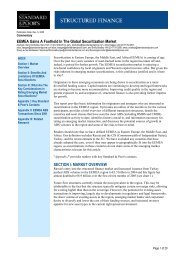and Master Programmes in German Higher Education Institutions
and Master Programmes in German Higher Education Institutions
and Master Programmes in German Higher Education Institutions
- No tags were found...
Create successful ePaper yourself
Turn your PDF publications into a flip-book with our unique Google optimized e-Paper software.
contrasted with the actual state of development as reported <strong>in</strong> the survey <strong>and</strong> reflected <strong>in</strong> theHSK data.Two central strategic decisions to be taken by <strong>in</strong>stitutions are whether they want to <strong>in</strong>troduceB/M comprehensively or only <strong>in</strong> selective subject areas <strong>and</strong>, related, whether theywant B/M to replace the exist<strong>in</strong>g degrees or they want the two degree structures to co-exist.4.3.1 Comprehensive versus selective <strong>in</strong>troductionIn our survey we asked respondents to tell us if Bachelor <strong>and</strong> <strong>Master</strong> degrees were alreadybe<strong>in</strong>g offered <strong>in</strong> all subjects, or whether they had only been <strong>in</strong>troduced <strong>in</strong> some subject areas.Accord<strong>in</strong>g to the respondents to our survey, there are some differences between typesof higher education <strong>in</strong>stitution with regard to whether or not all subject areas are covered.23 (or 41%) of FH respondents <strong>in</strong>formed us that Bachelor <strong>and</strong> <strong>Master</strong> degrees are be<strong>in</strong>g<strong>in</strong>troduced <strong>in</strong> all subject areas. This can be compared with 10 (or 18%) <strong>in</strong> the universitysector, <strong>and</strong> 4 (or 25%) among the TUs. It is <strong>in</strong>terest<strong>in</strong>g that only a few respondents <strong>in</strong>dicatedthat there is widespread resistance to the <strong>in</strong>troduction of Bachelor <strong>and</strong> <strong>Master</strong> degrees: thisresponse was given by 1 FH (or 2%), 4 Universities (or 7%), <strong>and</strong> 1 TU (or 6%).We also asked whether <strong>in</strong>stitutional management is aim<strong>in</strong>g for comprehensive <strong>in</strong>troduction.Across the three ma<strong>in</strong> sectors (FH, Uni, <strong>and</strong> TU), around a quarter (33 or 26%) of <strong>in</strong>stitutionalmanagement are hop<strong>in</strong>g to <strong>in</strong>troduce Bachelor <strong>and</strong> <strong>Master</strong> degrees <strong>in</strong> all areas 41 . Institutionalmanagement at FHs <strong>and</strong> TUs <strong>in</strong>dicated more often than at universities that theyare hop<strong>in</strong>g to <strong>in</strong>troduce Bachelor <strong>and</strong> <strong>Master</strong> degrees <strong>in</strong> all areas (16 or 28%, 5 or 31%, <strong>and</strong>12 or 21%, of FHs, universities <strong>and</strong> TUs, respectively). More than a third (47 or 37%) ofour respondents <strong>in</strong>dicated that they do not plan to <strong>in</strong>troduce these degrees <strong>in</strong> all areas. A bitmore than a third (45 or 35%) <strong>in</strong>dicated that <strong>in</strong>stitutional management has not decided aboutthis yet. There are, however, some differences between sectors: a nearly half of the respondentsfrom the university sector (27 or 48%), <strong>and</strong> half (8 or 50%) of the respondents fromthe TU sector <strong>in</strong>dicated that <strong>in</strong>stitutional management is not plann<strong>in</strong>g to <strong>in</strong>troduce thesedegrees <strong>in</strong> all areas. In the FH sector, on the other h<strong>and</strong>, less than a quarter of the respondents(12 or 21%) gave this answer. In the FH sector, nearly half of the respondents (27 or48%) <strong>in</strong>dicated that <strong>in</strong>stitutional management have not yet decided about this (comparedwith 15 or 27% <strong>in</strong> the university sector <strong>and</strong> 2 or 19% <strong>in</strong> the TU sector).4.3.2 Replacement versus parallel structuresIn Chapter 2 we reported the open discussion <strong>in</strong> the higher education community aboutwhether the new degrees should eventually replace the exist<strong>in</strong>g degrees - as recently suggestedby the Science Council - or if parallel structures should be ma<strong>in</strong>ta<strong>in</strong>ed <strong>in</strong> the longrun. In our survey, we therefore asked which tendency so far prevailed <strong>in</strong> <strong>in</strong>stitutions: B/Mreplac<strong>in</strong>g the exist<strong>in</strong>g degrees, B/M <strong>and</strong> the exist<strong>in</strong>g degrees runn<strong>in</strong>g parallel, or B/M <strong>and</strong>the exist<strong>in</strong>g so far exist<strong>in</strong>g side by side but with the <strong>in</strong>tention to replace the exist<strong>in</strong>g degrees<strong>in</strong> the medium run. Respondents <strong>in</strong>dicated that <strong>in</strong> most cases the older degrees cont<strong>in</strong>ue tobe offered, <strong>and</strong> that the Bachelor <strong>and</strong> <strong>Master</strong> degrees run parallel with them (rather thanreplac<strong>in</strong>g them <strong>in</strong> the short or long term). The highest number of respondents <strong>in</strong> each sectorgave this answer: 29 (or 52%) <strong>in</strong> the FH sector, 22 (or 40%) <strong>in</strong> the university sector, <strong>and</strong> 841 Most of these (26 out of 33) <strong>in</strong>dicated that they hope this will happen <strong>in</strong> the medium-term, but they do nothave a def<strong>in</strong>ite plan concern<strong>in</strong>g when this will happen.34


